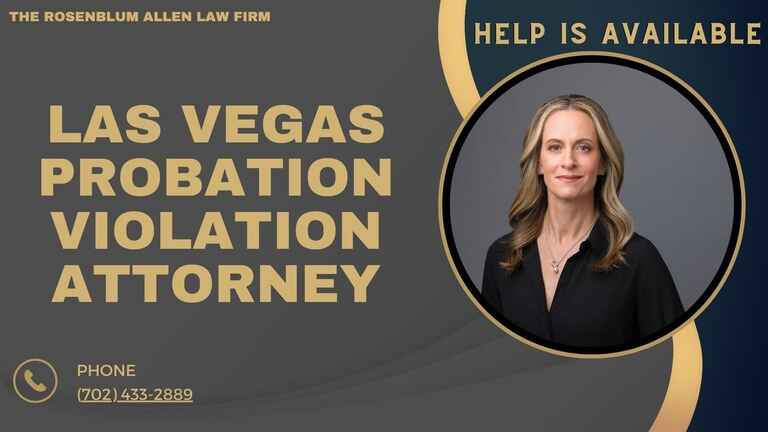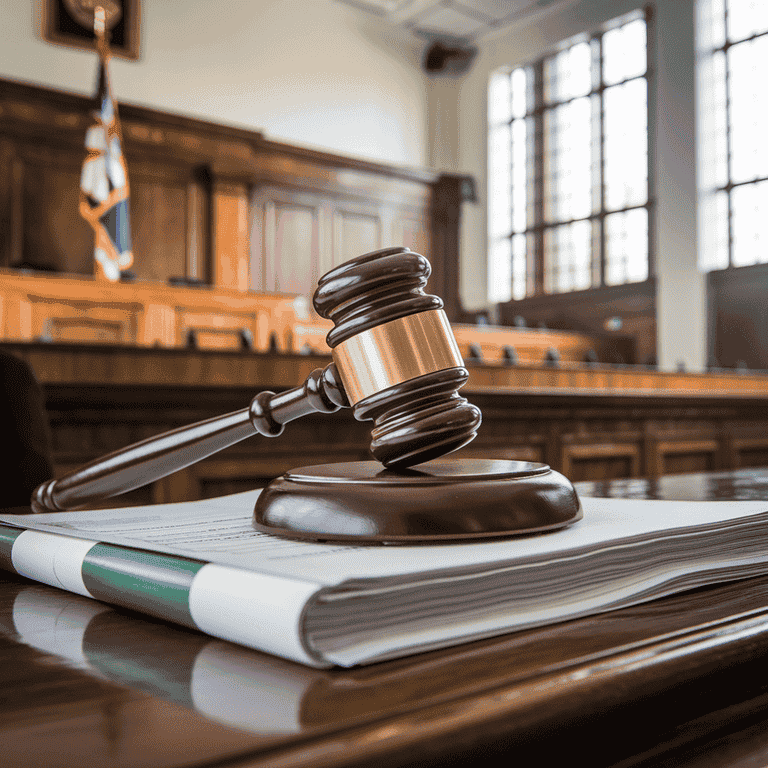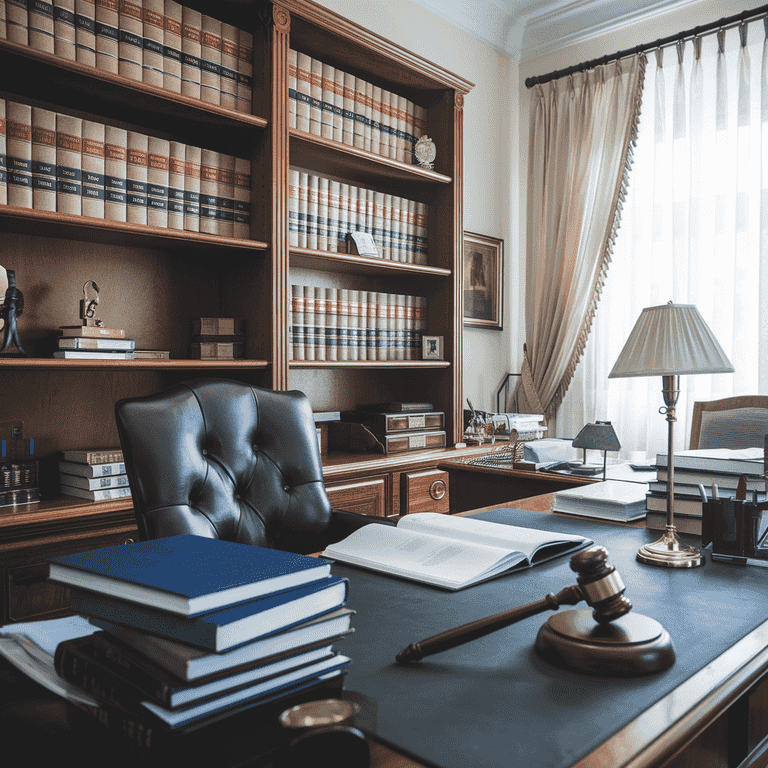Understanding Probation Violations in Las Vegas
What Is Probation?
Probation is a court-ordered alternative to jail or prison. It allows individuals to serve their sentence under supervision in the community. The goal is to rehabilitate and reintegrate individuals into society while protecting public safety.

Definition and Purpose of Probation
Probation is meant to:
- Hold individuals accountable for their actions.
- Provide an opportunity to avoid incarceration.
- Encourage positive changes in behavior.
Common Conditions of Probation
Probation comes with strict conditions that must be followed. These vary based on the case but often include:
- Reporting to a probation officer regularly – You must meet with your probation officer as scheduled.
- Paying fines or restitution – Courts may require financial compensation to victims or the system.
- Attending required programs – This can include counseling, substance abuse treatment, or educational courses.
- Avoiding criminal activity – Committing any new offense can lead to severe consequences.
Types of Probation Violations
Technical Violations
These occur when someone fails to meet the administrative requirements of their probation. Examples include:
- Missing a meeting with the probation officer.
- Failing to attend a required program.
- Traveling without approval.
Substantive Violations
These happen when a new criminal offense is committed while on probation. Examples include:
- Being arrested for theft, DUI, or other crimes.
- Participating in activities that violate laws.
Consequences of Probation Violations in Nevada
Potential Penalties
Probation violations can lead to severe consequences, including:
- Revocation of probation – You might have to serve the original jail or prison sentence.
- Imprisonment for the remaining sentence – The court can impose all or part of your suspended sentence.
- Additional fines or conditions – Penalties may include new probation terms, increased supervision, or financial costs.
Impact on Future Legal Outcomes
Probation violations can affect you long-term:
- Longer probation terms – Violating probation might result in an extended period of supervision.
- Harsher penalties for future offenses – Courts may be less lenient if you’re charged with another crime.

Steps to Take if Accused of a Probation Violation
Facing a probation violation can feel overwhelming, but taking the proper steps early can make a difference. Understanding the process and your options is critical to building a solid defense.
Understanding the Allegation
Reviewing the Probation Officer’s Report
The probation officer will report any suspected violations to the court. This report outlines:
- The specific condition(s) you are accused of violating.
- The evidence supporting the alleged violation.
- Recommendations for penalties.
Please request a copy of this report so we can understand your situation.
Identifying the Alleged Violation
Clarify what part of your probation is in question. Is it a missed meeting, failure to complete a program, or a new criminal charge? Knowing the exact issue will help you decide your next steps.
Communicating with the Probation Officer
Explaining the Circumstances of the Alleged Violation
Contact your probation officer immediately if the issue is minor, such as missing a meeting. A clear explanation might prevent the situation from escalating. Examples of valid explanations include:
- Illness or emergencies.
- Misunderstanding instructions.
- Documentation showing compliance, such as attendance records.
Providing Evidence of Compliance
Prove you’ve met your obligations where possible. Submit documents like:
- Proof of payments for fines or restitution.
- Certificates of completed classes or programs.
- Any communication that shows attempts to fulfill conditions.
The Probation Violation Hearing Process in Las Vegas
If your probation officer files a violation report, the court will hold a hearing to review the case. This is not a criminal trial but a legal process to determine if you broke your probation terms.
How Probation Violations Are Addressed in Court
Role of the Probation Officer in the Hearing
The probation officer’s report plays a central role. They may testify about the following:
- The nature of the alleged violation.
- Any conversations or warnings given before reporting the breach.
- Recommendations for penalties or alternatives.
Legal Standards in Probation Violation Cases
Probation hearings have different standards than criminal trials. The prosecution only needs to show:
- The preponderance of the evidence – More likely than not, a violation occurred.
- This lower standard means even minor missteps can lead to severe consequences.
Your Rights During the Hearing
The Right to Present Evidence
You can submit evidence to prove you did not violate your probation or to explain your actions. Examples include:
- Witness testimony.
- Written records or logs of your compliance.
- Documentation of any mitigating circumstances.
The Right to Cross-Examine Witnesses
If the probation officer or witnesses testify, your attorney can challenge their statements. Cross-examination helps uncover inaccuracies or misunderstandings in their account.

Common Defenses to Probation Violation Allegations
Defending against probation violation allegations requires a strategy that fits the case’s specifics. The court will review all evidence, explanations, and circumstances to decide whether a violation occurred and how it should be handled.
Challenging the Evidence
Insufficient Proof of a Violation
The prosecution must present enough evidence to convince the court that a violation likely occurred. Some ways to challenge this include:
- Pointing out gaps in the evidence, such as missing documents.
- Highlighting inconsistencies in witness statements.
- Questioning the accuracy of reports, such as incorrect test results.
Proving Compliance
Sometimes, the alleged violation is due to miscommunication or errors in record-keeping. You can defend yourself by showing proof of compliance, such as:
- Attendance records for required meetings or programs.
- Receipts for fines or restitution payments.
- Proof of clean drug tests.
Explaining the Circumstances
Unintentional or Justifiable Noncompliance
Life can get complicated, and sometimes probation conditions are unmet for valid reasons. Courts may consider these, especially if the violation wasn’t intentional. Some examples include:
- Medical emergencies prevent you from meeting with your probation officer.
- Transportation issues that caused delays in attending a required program.
- Being unaware of a new condition added to your probation terms.
Lack of Knowledge
This can be used as a defense if you weren’t aware or were never informed about a probation condition. Clear communication with your probation officer is essential, but misunderstandings can happen.
Potential Outcomes of a Probation Violation
The outcome of a probation violation hearing depends on how severe the violation is and your prior history. Courts want to balance accountability with fairness.
Possible Penalties
Revocation of Probation
If the violation is severe, the court might revoke probation entirely. This could lead to:
- Serving the original jail or prison sentence.
- Additional penalties related to the new offense, if relevant.
Modifications to Probation
Instead of entirely revoking probation, the court might adjust its conditions. These changes could include:
- Extending the probation period.
- Adding new conditions, such as more frequent check-ins or mandatory counseling.
- Increasing the number of community service hours.
Jail Time
In some cases, courts impose short jail stays as a penalty. This acts as a warning without entirely revoking probation.
Avoiding Severe Penalties
Voluntary Steps to Correct Violations
Taking proactive steps can show the court that you’re committed to compliance. This might involve:
- Completing missed obligations before the hearing.
- Enrolling in required programs, even if late.
- Submitting a written explanation and apology for minor violations.
Building a Strong Case with Legal Help
Having a skilled attorney can significantly influence the outcome. They’ll help gather evidence, present defenses, and argue for leniency.

Choosing the Right Las Vegas Probation Violation Attorney
Having the proper legal representation is essential when facing a probation violation. A skilled attorney can guide you and fight for the best possible result.
Qualities to Look for in an Attorney
Knowledge of Nevada Law
Probation laws and court procedures vary by state. An attorney familiar with Nevada’s legal system will know how to navigate its specific rules.
Experience with Probation Violation Cases
Probation violations are different from other legal matters. Look for an attorney who has handled similar cases and has a good track record.
Benefits of Hiring an Attorney
Strategic Guidance
An attorney can review your case and develop a defense strategy that suits your situation. This can include:
- Challenging weak evidence.
- Negotiating for leniency with the court.
- Highlighting mitigating factors, such as efforts to comply.
Representation in Court
Navigating a probation violation hearing can be intimidating. Your attorney will:
- Present evidence on your behalf.
- Cross-examine witnesses.
- Argue for fair treatment and minimal penalties.

Breaking It Down for You
Facing a probation violation in Las Vegas can be challenging and stressful, but it doesn’t have to control your future. Understanding the potential consequences and the defenses available to you is essential for taking charge of your situation. Whether you’re disputing the evidence or explaining extenuating circumstances, presenting a solid case is vital for reducing penalties.
If you’ve been accused of violating probation, it’s important not to go through this process alone. Partnering with a skilled attorney can make a significant difference. They can assist in building a solid defense, negotiating for lighter penalties, and providing you with the best opportunity for a positive outcome.
Remember, a probation violation doesn’t automatically mean the end of your path to rehabilitation. With the right approach, you can move forward and keep making progress.

Frequently Asked Questions
What happens if I violate probation in Las Vegas?
A probation violation can lead to serious consequences, including additional conditions on your probation, increased supervision, fines, or even imprisonment. The court will evaluate the nature of the violation and decide the next steps, including a hearing to determine if your probation should be revoked.
Can I get my probation revoked if I don't report as instructed?
Failing to report to your probation officer as required can be considered a probation violation. Depending on the specifics of your case, this could lead to a hearing where the judge may decide to extend your probation or impose harsher penalties.
Is there a way to avoid jail time if my probation is violated?
Yes, there are ways to avoid jail time, such as showing that the violation was not intentional, presenting a valid defense, or demonstrating that you are actively seeking rehabilitation. An experienced attorney can help you present your case effectively and explore options like additional probation conditions or community service instead of jail.
How long do I have to serve if my probation is violated?
The time you may have to serve after a probation violation depends on the specifics of your case, including the nature of the violation and any previous history. If your probation is revoked, the judge will typically determine the appropriate sentence, including serving time in jail or prison.
Can my probation violation affect my criminal record?
Yes, a probation violation can impact your criminal record. If your probation is revoked and you serve time in jail or prison, your record will likely reflect the violation. This can affect future legal proceedings and may impact job opportunities or housing.
What is the difference between a technical violation and a substantive violation?
A technical violation refers to failing to meet specific conditions set by the court, such as missing meetings with a probation officer or failing a drug test. A substantive violation involves committing a new crime while on probation. Both violations can lead to hearings and potential consequences, but substantive violations often carry more severe penalties.
How can I prepare for a probation violation hearing?
Preparing for a probation violation hearing involves gathering evidence, understanding the charges against you, and working closely with your attorney to build a solid defense. Your attorney can help you gather character references, proof of rehabilitation efforts, or other relevant information to present to the court.
Do I need a lawyer for a probation violation?
While having an attorney for a probation violation hearing is not legally required, it is highly advisable. A skilled attorney can help navigate the legal process, advise on possible defenses, and fight for the best possible outcome, which may include avoiding jail time or reducing penalties.
Can I negotiate my sentence if I violate probation?
In some cases, it may be possible to negotiate a lesser sentence or alternative penalties if you have violated probation. An experienced attorney can work with the court to present mitigating factors and negotiate for a more favorable outcome, such as extended probation or community service instead of jail time.

Offsite Resources for You
Here are some offsite resources that may help understand probation violations and related legal topics:
- National Institute of Justice
Offers research and resources on probation, parole, and corrections practices. - American Bar Association (ABA)
Provides resources and articles about probation law and the criminal justice system. - FindLaw
A trusted resource for legal articles, guides, and information on probation violations and criminal law. - The Sentencing Project
Provides research and policy recommendations on sentencing and probation issues in the U.S. - Justice.gov
The official U.S. Department of Justice site with information on criminal justice procedures, including probation violations. - American Civil Liberties Union (ACLU)
Offers resources related to civil rights, criminal justice reform, and probation issues.
These resources offer additional information and can significantly help anyone navigating probation-related matters.

What's Next for You?

Thank you for reading through these resources. I hope they have provided valuable insights into the complexities of probation violations and criminal defense.
At The Rosenblum Allen Law Firm, we are committed to providing clear, practical legal guidance tailored to your specific needs. If you or someone you know is facing a probation violation or any criminal charge, I encourage you to contact us. We offer a free consultation to discuss your situation and explore how we can help.
To schedule your free consultation, please call (702) 433-2889. We’re here to support you every step of the way.
Best regards,
Molly Rosenblum Allen, Esq.
The Rosenblum Allen Law Firm


